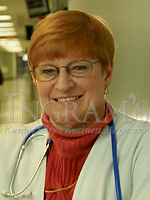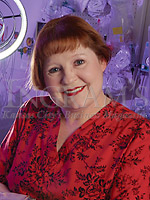Diana Poorman Menorah Medical Center

Diana Poorman, registered nurse and cardiology manager at Menorah Medical Center, has taken the notion of an ounce of prevention to heart, literally.
Poorman, a 23-year veteran, was instrumental in helping to establish Menorah’s Congestive Heart Failure clinic in 1994. After examining admissions data, Poorman identified patients with CHF as the most frequent re-admissions to the hospital.
Since opening the clinic, Poorman and her co-workers have managed to greatly reduce the number of re-admissions, emergency room visits and hospital stays for patients with CHF. In addition to her work with patients, Poorman is also responsible for the daily operations and performance enhancement for the CHF clinic.
But Poorman’s work extends beyond the hospital walls. She established a speaking program to spread a heart-smart attitude to the community and now Poorman frequently is invited by businesses to speak with their employees, urging them to consider their own heart health.
Overall, Poorman believes the clinic has helped improve the quality of life for CHF patients by focusing on what she calls “the tripod of mind, body and spirit.”
“We call it total patient wellness, and it sounds a little hokey,” she says, “but we’ve found that just one of these things being out of kilter can cause problems. We pride ourselves on paying attention to all three.”
Jody Gyulay North Kansas City Hospital

All of Jody Gyulay’s patients know they are terminally ill. As coordinator of the Palliative Care Unit at North Kansas City Hospital, Gyulay’s job is to help terminal patients and their families see that even if there is no hope for recovery, there is still hope.
“There is always hope,” Gyulay says. “Hope to die with dignity. Hope for loved ones. Hope is always there, just in different forms.”
She fell in love with the work more than twenty years ago, though at that time, she says, “No one in the hospital would talk to you if you worked with the dying. You were ridiculed, called the Black Cape Group.”
Over the years the subjects of death, dying and bereavement have become less taboo within the medical community and society as a whole. This is due in large part to the work of people like Gyulay and the late Dr. Elisabeth Kübler Ross, with whom Gyulay studied and credits with giving her the courage to continuein her chosen field.
In addition to her direct work with patients, Gyulay also educates staff to help work with terminal patients of all ages. Gyulay is also a founder and past president of The Grief Institute of Mid-America and helps people deal with unexpected death in her role as a local adviser for Parents of Murdered Children and Victims of Homicide.
Ultimately, Gyulay characterizes her job as not about “giving patients more days of life, but helping them to find more life in each day.”
Linda Seba Saint John Hospital

An 18-year veteran of Saint John Hospital’s emergency room in Leavenworth, Kan., nurse Linda Seba admits she’s addicted to the thrill of helping people under traumatic circumstances.
“Every day, you never know what’s going to walk through that door,” says Seba. “You have to deal with whatever walks in right then, right there.”
It was Seba’s dedication to her high-stress job and her desire to help people that drove her to help create an off-site sexual assault center to help rape victims.
“Rape victims have been humiliated enough,” says Seba. “It (Leavenworth) is a small town. You walk in the hospital, see someone with an advocate and a police officer, then we take them in the back. It’s not too difficult to figure out what’s going on.”
Over the span of a few years and working with Kay Andersen, executive director of the Alliance Against Family Violence, Seba managed to generate enough funding to establish the sexual assault center. At the time of its opening, the center was the first of its kind in the metro area to be located off hospital grounds, offering a sense of privacy and security to assault victims.
The center offers victims a comforting, dignified environment that addresses several of the needs of sexual assault victims, from clinical examinations to medicine and support groups.
In addition to coordinating the sexual assault center, Seba is currently serving as interim supervisor of Saint John’s Senior Behavioral Center. But admittedly she’s itching to get back to the ER.
“It’s sort of a junky kind of feeling of excitement,” says Seba. “We fix people.”
